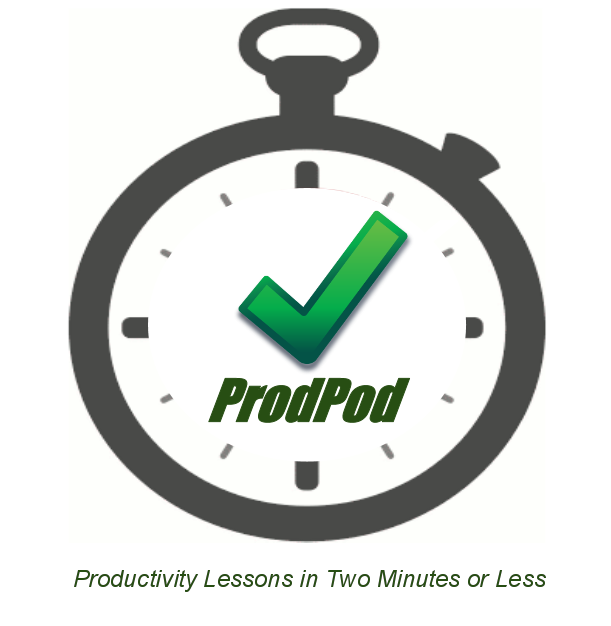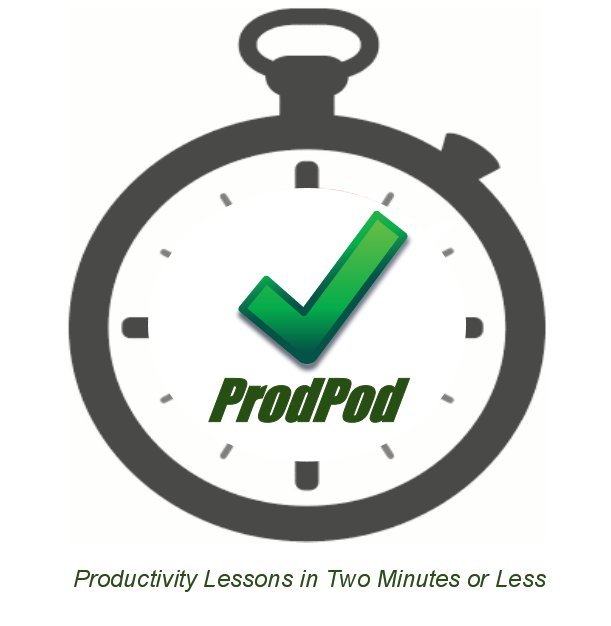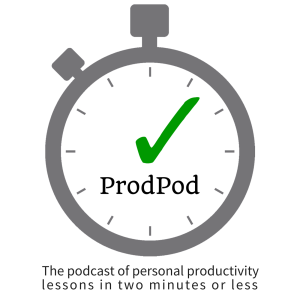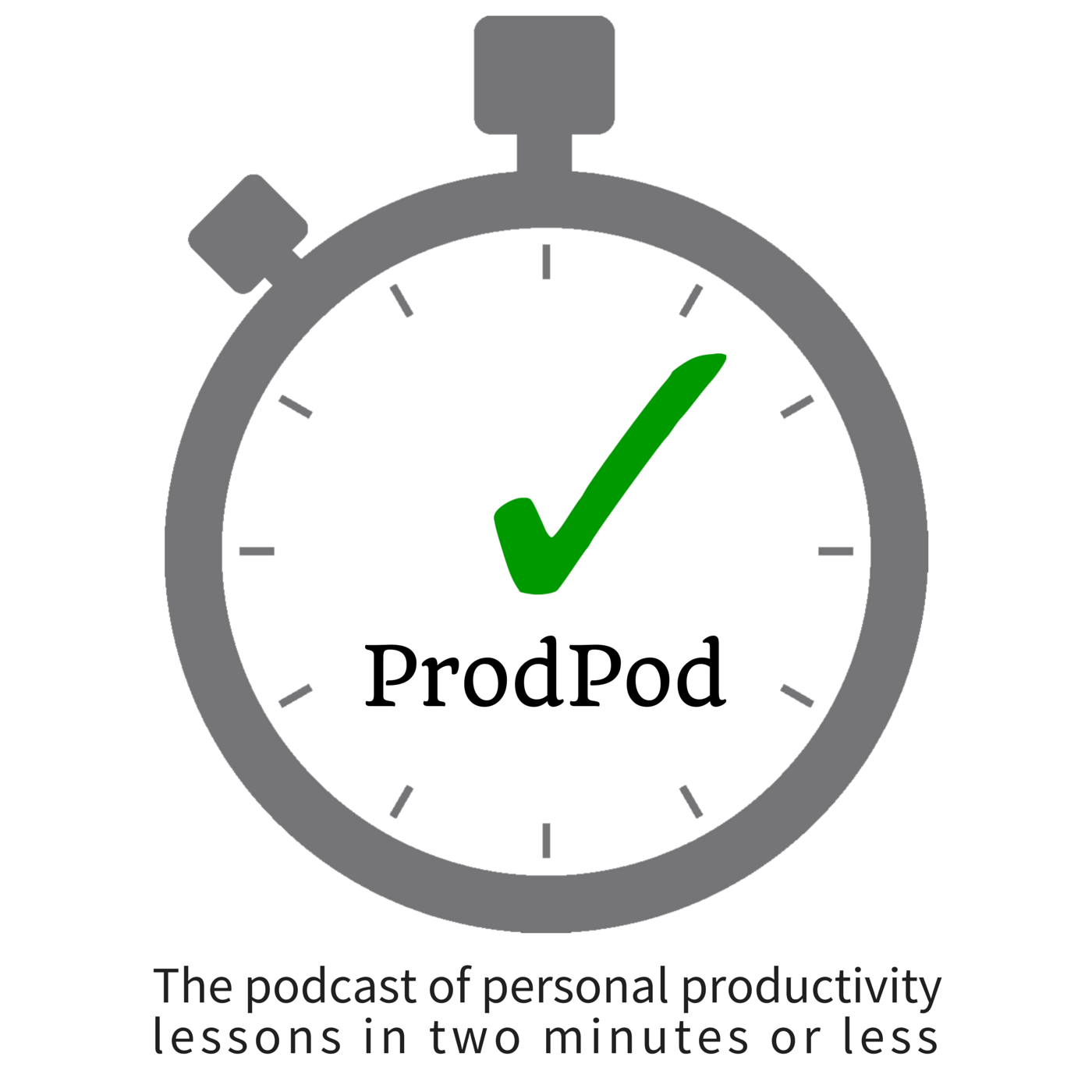Episodes

Thursday Jan 10, 2013
Thursday Jan 10, 2013
I had the pleasure of interviewing the author of 25 Tips for Productivity Success (bit.ly/25t4p), Augusto Pinaud (augustopinaud.com), before #Prodchat on January 9th (See transcript: sfy.co/fDDm ). He highlights two of his book's tips for us. Enjoy!

Tuesday Dec 18, 2012
ProdPod: Episode 47 -- Conquering Negative Self-Speak for Greater Productivity
Tuesday Dec 18, 2012
Tuesday Dec 18, 2012
Negative self-speak eats away at productivity and no one is immune from it at high stress times in our lives. And, while you may have positive self-esteem, you may still have negative self-speak creeping into your daily life. In this episode, I give you a three-pronged approach to eliminating self-speak from your productive life.
Daily affirmations:
1. First, you need to identify what you think are your strengths and weaknesses. You can probably name quickly off the top of your head how you're a best asset to your family, your friend network and at the office in your job duties or beyond. Now, where do you feel like you could improve? Write down a list of "I" statements of your strengths. Then, do the same with your weaknesses but write them down in the inverse. For example, if I felt my weakness was in follow-through with my coworkers' requests, I would write something like, "My coworkers can depend on me to follow-through with their requests in a timely manner." Now, merge the two lists and read them aloud to yourself (perhaps in a mirror if that helps) every morning. This will build the brain pathways to unlocking new strengths and solutions.
2. Next, write down every negative word you say in the course of a week as you recognize them and pay attention to change the language whenever you hear yourself saying something negative about yourself.
Negative Self-Speak Lexicon:
3. Finally, enlist your friends, family and coworkers with scripts encouragingly worded to alert you of negative self-speak when you don't notice it. With each alert, remember to restate your self-speak positively. This may even help your friends, family and coworkers resolves some of their own negative self-speak!
With daily affirmations, knowing your negative self-speak lexicon and the help of your friends, family and coworkers, you'll be on your way to conquering your negative self-speak for good!

Tuesday Dec 11, 2012
ProdPod: Episode 46 -- Talking Yourself Into Better Productivity
Tuesday Dec 11, 2012
Tuesday Dec 11, 2012
Most people associate the idea of talking to one's self as a problem. However, the kind of talking to yourself I discuss in this episode I think makes you more productive thereby increasing your sanity!
We all have an inner voice; it is a collection of our approximately seventy thousand thoughts per day converted to words as we consciously think them. Let's enlist for our purposes of this discussion Dr. Stephen Covey's Seven Habits definition of control, which is the space between stimulus and response. If that's the case, then when we verbalize our thoughts aloud, we vet our thoughts more thoroughly commanding only the best quality of decisions to act upon. Think about it, if you say what all your decisions are going to be out loud (even privately in your own office/home), aren't you going to be more mindful?
I tend to think of this technique in the face of high distraction or procrastination, so I'll give a real life productivity scenario of my own to demonstrate. My ideal morning routine is to check my inboxes, processing and responding to my morning messages before I start the rest of my workday. I'm a FIFO kinda guy (that is, first in, first out -- meaning, I scroll to the bottom of my inbox and read the chronologically first message in, process and/or respond, and move on to the next message). If I'm having a particularly difficult time keeping focused on my inbox or starting at all, I'll literally say out loud to myself, "Ray, you're focusing on the first message to read & respond." I'll repeat myself ad nauseum until I re-focus and continue on my decision to process my inbox.
So, go forth and take control of your work and life by talking yourself into greater productivity!
// Let's take this idea of talking to yourself into a real life productivity scenario. I come into the office in the morning after a long and trafficked commute. I open up my computer and prepare myself for the day, but still feeling a tinge frustrated by the tribulations of my morning so far. Up pops my email and I scroll down to the bottom to find the first email in from last evening (as I'm a last in, first out email kinda guy). The message is from a client barking orders about this or that and I lose my temper at this client's clear lack of regard for my time and how much work I've put into the process. Pause. Let's take my inner voice and make it my outer voice now. "I'm frustrated by this morning's commute. And, this client wrote me at six o'clock last evening. So, they clearly didn't intend for me to read this message in this negative mindset.

Friday Dec 07, 2012
ProdPod: Episode 45 -- Productivity and Whole-Being Fitness
Friday Dec 07, 2012
Friday Dec 07, 2012
I believe most people think of "fitness" and think about living a healthy lifestyle, however, I have long thought of it under a much broader context I call "Whole-Being Fitness." In this episode I explain my concept of Whole-Being Fitness and why it's so important to your productive life.
Let's take the example of how Whole-Being Fitness works in real life. that I've decided to run a marathon in a few months. So, to prepare for the mental image of a successful marathon photograph of me crossing the finish line I need to think first about my physical fitness...cross-training along with my core endurance training, then working up to personal training milestones (which for me are 18 and 24 miles). Further, let's look at the additional areas of Whole-Being Fitness as ways of making sure that I don't put the cart before the horse. Mental Fitness clues me into how I intend to run this marathon. There're several methods for running marathons, including the increasingly popular Galloway method. As well, what's my mindset for finishing this marathon? Just finish, or am I trying to set a personal time record? Broadly, emotional and social intelligence fitness guides me in getting all of my running friends together so that I have support during training and potentially someone to run the marathon with me. They may also be folks to support me along the way so I can shed gear and get a snack as I make my way along the marathon course on race day. To be Nutrition fit I have to make sure I'm taking in enough calories and the right balance of macronutrients to fuel and replenish what my body is going to burn during cross-training and long runs. My Rejuvenating Fitness teaches me that I need self-care to motivate myself through short, medium and long-term rewards for getting across the finish lines of every training run. And the all important Sleep Fitness gives my body the needed rest for my body to recuperate from the punishment it's going to take. Literally, if I don't sleep properly three or four nights straight before my long runs, my running speed will suffer. Finally, Do you see how interwoven each area of Whole-Being Fitness is to your overall success? I cannot emphasize enough that I cannot work harder at only one of these Whole-Being Fitness areas to compensate the fitness lacking in another. I do so at my own detriment.
Although I used an endurance athletic event as an example, Whole-Being Fitness matters in every aspect of your productive life. The more fit you are in each area, the better your productivity.
// If you look at every aspect of your work and life productivity--every major work project, job role or personal goal--these seven fitness areas touch on your ability to perform in them interdependently and better. So, whether it's learning to play an instrument better...to writing that next sales proposal...or passing that upcoming exam, you need to contemplate how Whole-Being Fitness can make achieving your goals and overcoming your challenges easier and more sustainable.

Tuesday Oct 23, 2012
Tuesday Oct 23, 2012
Back in the 1960's, there was a movement that developed, founded on the core concept that we could help people become happier, more fulfilled and more creative. It was called the Human Potential Movement. Further, we know so much about personal productivity today because of the Human Potential Movement and yet so few people actually know its history and how you can use this core concept to enhance your productive life. To learn more about its history, visit the Wikipedia entry (http://en.wikipedia.org/wiki/Human_potential_movement). But, to unlock HPM's potential though, listen on.
The late Dr. Stephen Covey, of which many of you know I'm an ardent fan of his works, took the humanistic psychology principles of HPM and turned them into a book, The 8th Habit, which was a culminating work from his most well-known book, The Seven Habits of Highly Effective People. You can find several PDF summaries of The 8th Habit via a Google Search. From Aldous Huxley to Anthony Robbins and Abraham Maslow to George Leonard, Dr. Covey wraps the principles of these proponents into a simple and effective action plan based on the premise that your life (and society at large) will get exponentially better when people find their own passion, mission, vision, life purpose, professional goal or what have you (and he calls this "finding your voice"), then help others find their voice.
This bears repeating: find your voice. Then, help others find theirs. If you want to dive deeper into this concept, review the PDF summaries or buy the book.
By the way, this is not a supplanting of the seven habits outlined in Covey's acclaimed The Seven Habits of Highly Effective People, and it is I believe a supplement to productivity systems that promulgate time management (Forrester, Morgenstern and those folks) as well as action management (for those of the Getting Things Done or GTD, methodologies). The Human Potential Movement has come a long way and we have much to thank for it, so don't let it lie their in vain. Head out and find your mission and vision (which you can do by yourself or using a tool like the Mission Statement Builder at franklincovey.com/msb) and make it a productive life!

